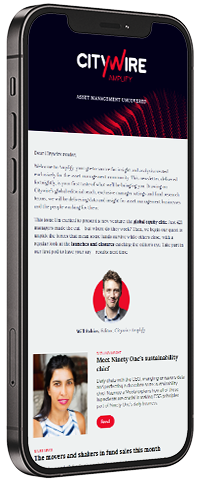There might be light at the end of the tunnel, but it ain’t here yet.
Tokenised funds: ‘As easy as clicking the buy button’
Latest Newsletter
Value stance rewards managers with first AAA rating
The year comes to a close with a host of managers gaining their AAA wings.
Real Life: A cheaper, smarter way to fly business to the US
Companies are clamping down on travel costs. Here’s how to travel in comfort while keeping the expenses department happy.
Community
Private assets for the people. You may not see that on too many placards out on the streets, but getting alternative asset exposure into the hands of non-institutional clientele is very much the new frontier of what CEOs like to call democratising investment.
There’ll be no prizes for guessing the answer is digital, but this mission brings asset managers into the realm of that most talked-up technology: blockchain.
Most recently, Schroders acquired a majority stake in Forteus, a specialist in blockchain and digital assets.
The London-based asset manager said it made the investment to ‘support its ongoing education and research in this sector and to develop investment solutions for the benefit of its clients’.
For Peter Harrison, Schroders’ group CEO, blockchain has the potential to drive the democratisation of private assets.
When Schroders set up its private assets arm, Schroders Capital, last year, it highlighted democratisation as one of its goals. This is clearly in line with that ambition.
In recent years, more and more asset managers have been thinking about how to use blockchain technology for this purpose. Tokenisation is one way several firms have tried.
How Hamilton Lane tokenised its fund
In March, Alternative asset manager Hamilton Lane said it would offer tokenised access to its flagship Global Private Assets fund. The fund, which has $2.2bn in assets, is an open-ended strategy domiciled in Luxembourg.
Partnering with Singaporean digital securities exchange ADDX, Hamilton Lane enabled accredited investors to invest in the fund from $10,000, compared with its usual minimum of $125,000.
Frederick Shaw, the firm’s chief risk officer, said tokenising a fund is fairly simple for an issuer. Shares in the fund are digitally represented and can be traded and recorded on a distributed ledger. Hamilton Lane has a token offering every month – this is when investors can buy tokens. The amount of money raised in that token offer is then invested in the main vehicle in Luxembourg.
Shaw said asset managers can tokenise a fund in two ways – the easy way or the hard way. The hard way involves setting up a blockchain, which would have significant costs and complexities. Hamilton Lane chose the easy way: partnering with an entity that owns and runs a blockchain.
ADDX is as experienced as one can get in this space. The firm was launched in 2017 and listed the first tokenised fund in March 2020: the Eternal Glade fund.
Since then, it has listed several tokenised funds, including the SeaTown Private Credit fund, the Partners Group Global Value Sicav and the Global ESG Innovators fund launched by Hanwha Asset Management.
‘From an administrative perspective, it’s very easy. It just looks like another investor in our fund and underlying that investment, ADDX has the technology and the token,’ Shaw said.
Simplified process
Hamilton Lane focused on the Asian markets because of the region’s booming wealth and the friendly regulatory regime in Singapore. Singapore is particularly tech-friendly, Shaw said, which is why tokenisation is developing more quickly in that part of the world.
The partnership began with ADDX putting Hamilton Lane through something akin to an IPO underwriting process – conducting due diligence and giving approval to be on the exchange. As ADDX is a regulated exchange in Singapore, it is responsible for anti-money-laundering (AML) and know-your-client (KYC) checks.
To get their money out, investors can either request a redemption through the monthly redemption process and receive the net asset value of their token, or sell the token privately on the exchange.
‘The tokenisation of a private fund solves a lot of problems,’ Shaw said. ‘Think about the process that exists today to invest in private funds; it’s very cumbersome. You have 80-page subscription documents every time, KYC and AML checks, capital calls etc. This way, AML and KYC are already done, the digital wallet is linked to your account on ADDX, and it’s as easy as clicking the buy button.’
No solution is perfect, of course. Although tokenisation does provide more liquidity – as tokens can be bought and sold without having to liquidate the underlying assets to meet redemption requests – investors must understand that there are limits to how quickly they can get their money out if needed.
In addition, some have warned of a heightened risk of fraudulent transactions. There are also concerns about the risk of hacking. After all, these are essentially digital assets.
Amplify has picked the best bits of the Schroders CEO’s comments to analysts. Read them here, along with Amplify’s commentary.
Latest Newsletter
Amplify Issue 30: The fund groups topping the tree
We analyse which groups have had the biggest inflows and outflows in 2022, look at managers achieving their first AAA ratings, and hear from Rob Kyprianou on why regulation gets it back to front.
Amplify Issue 29: Red hot: 2022’s private market hiring spree
2022 has been a hot year for private markets, but are asset managers putting the brakes on their expansion efforts? Plus, we look at how the bear market has affected launches this year and look at how firms can better communicate their brand values.
Amplify Issue 28: Fill your ESG product gaps
We hear from fund buyers on what they’re looking for from an ESG fund, find out what Neuberger Berman is plotting in the alts world, and learn the winners of Citywire’s Gender Diversity Awards.
Community
